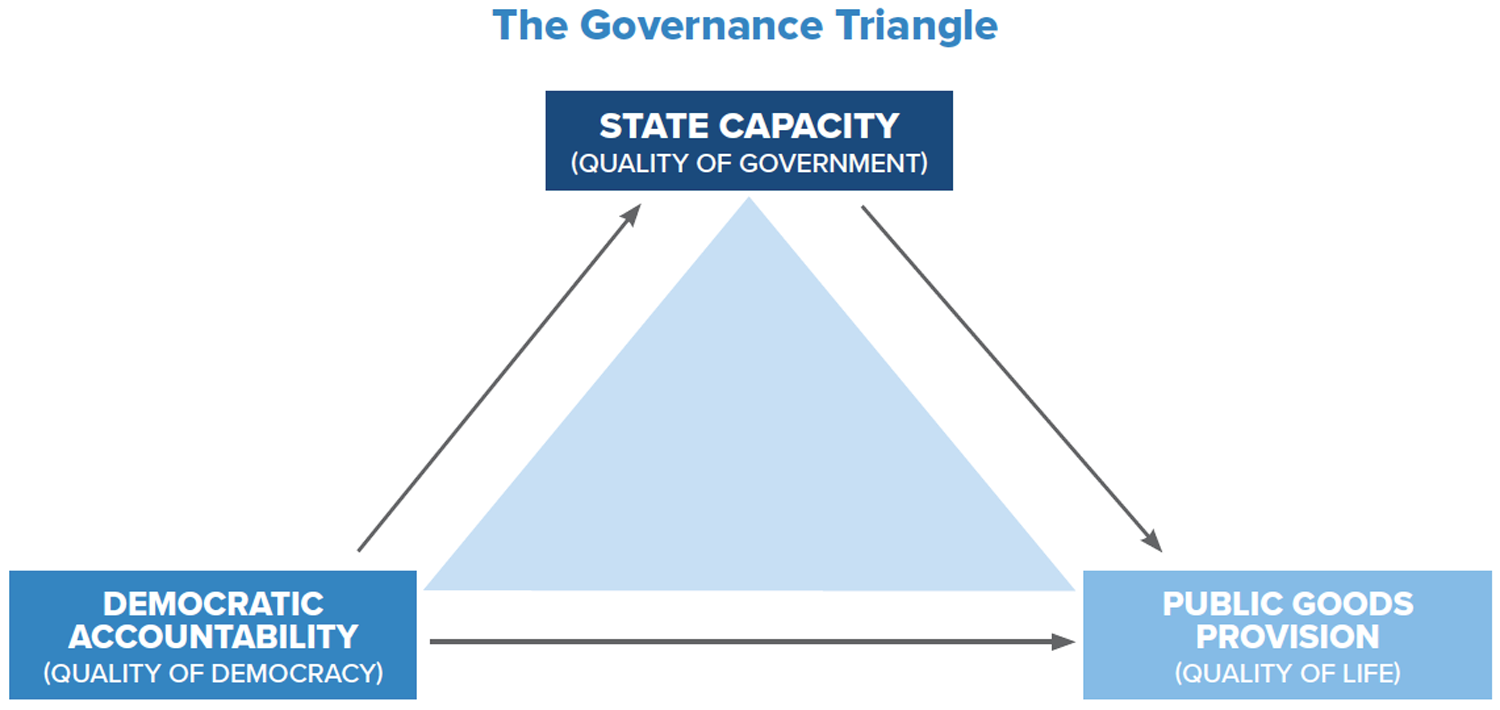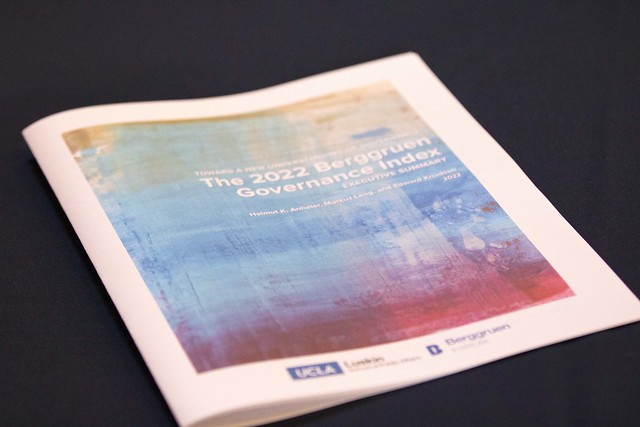Research centers are born for a variety of reasons. Sometimes, it’s just the right thing for a public research institution like UCLA to do. In the case of the Latino Policy and Politics Institute (formerly Initiative), “it was the single-biggest missing element in the School,” said Gary Segura, who co-founded LPPI soon after he became dean at UCLA Luskin in 2017. “We were a school of public affairs in a state that is 43-44% Latino, and we didn’t have any faculty expertise focused on that area.” Learn more about LPPI, which has attained funding of $13.5 million in just five years of existence, from its founding director, a current student fellow and an alumna whose time with LPPI has proven crucial to her career.
Sonja Diaz MPP ’10, founding director of LPPI
What are you working on now?
A U.S. Latino data hub will create a portal for the first time of taking government data and disaggregating it by Latino subgroups. So, you’ll get a sense of the differences between Cubans in Florida and Puerto Ricans in Florida. And that, frankly, hasn’t been done across a number of indicators, from housing to the environment to voter registration. The second big project is a summit, and we’re trying to create a programmatic nexus between our scholars, our staff and our different policymaking audiences, lawmakers and researchers who need the support to have a Latino lens. We’re hoping to convene people in Washington, D.C., and establish a national presence for LPPI.
How did your directorship at LPPI come about and what has it meant for you personally?
I was leaving a position with a statewide constitutional officer at a time when we expected a different outcome from our 2016 U.S. presidential election. And it made sense for me to look at UCLA, which is personal to me and my family. My father received a Ph.D. in urban planning here when I was a toddler. Some of his faculty are my colleagues today. And in that way, it’s been one continuous line. What I didn’t expect was to be given the opportunity to marry policy and research.
Now, after being on this job for a number of years, I am recognizing the impact that we’ve had, not only in the students that have walked through our doors, and even our staff colleagues, but to our community members. It has been mind-blowing.
Recent successes of note?
Two things happened in ’20-21 that I think were so important for LPPI, but also for the Latino community writ large. The first was our work to advance full representation of Latino politicians to an important body, which is the U.S. Senate. And that was cemented with Gov. [Gavin] Newsom’s appointment of now-Sen. Alex Padilla, the first Latino in over 170 years to occupy that office.
The second thing, and this was happening at the same time, was providing a data lens to the COVID vaccine policy in the state of California that, in many ways, had disenfranchised youthful racial minorities, including Latinos, in the face of the evisceration of Latino households during COVID-19. And our work with over 40 community organizations, based on our data analysis, really changed course for the state and made it so it wasn’t just wealthy and older Californians who had access to the vaccine, but the hardest-hit communities that were working on the front lines.
Bryanna Ruiz Fernandez, an LPPI student fellow who majored in political science and minored in public affairs and Chicano/a studies and who will join the U.S. Consumer Financial Protection Bureau as a policy fellow after graduation
Talk about yourself, your role at LPPI and your future plans.
I am a proud product of immigrants. I come from a mixed-status household. We are from a border town, El Centro, California. I actually grew up in Mexico for part of my childhood, until I was around 8 years old. And then we immigrated to the United States. Spanish is actually my language of birth. And my mom, just recently, I was able to sponsor her for residency, for her green card.
She just became a U.S. resident, and it was a huge deal for the family because of the laws that can be discriminatory and negatively impact one’s life.
And my dad is in the process.
I understand immigration policy firsthand, and when it’s not properly researched by people with firsthand experience or who are culturally competent, what kind of impact it can have on communities of color, like my family.
I feel very fortunate to have been a fellow for LPPI for, basically, my entire undergraduate career.
In the classroom, I was learning methods and these broad concepts, but I didn’t really understand, especially as a first-generation college student, how that applies to the real world.
As a fellow, I was able to work with UCLA faculty. I was able to see firsthand how they conduct research, how they write reports. And on the other hand, I was also able to see how that research needs to be amplified. Because if we’re doing research and no one knows about it, then what impact is it actually having?

MPP and MSW alumna Gabriela Solis Torres
Gabriela Solis Torres, MPP and MSW ’19, a founding student fellow at LPPI who now works as a project leader for the Harvard Kennedy School’s Government Performance Lab in Houston, Texas
Please explain your work.
We’re a research and technical assistance organization that provides support to governments who are pursuing ways to combat some of the most complex social challenges. That’s things like trying to reform the criminal justice system or the child welfare system, or trying to address homelessness.
A lot of things have changed because of the pandemic. But a big change in my work came after the murder of George Floyd. Harris County, where Houston is, and a lot of other jurisdictions across the United States started thinking about what their policing looks like and really started exploring, I think, more seriously the alternatives to their emergency response approach.
And now I’m leading our portfolio for alternatives. I provide technical assistance to five jurisdictions across the United States that are implementing alternatives such as sending unarmed teams to 9-1-1 calls.
Did your experience with LPPI have a direct relationship to what you do now?
For me, I think it really opened my worldview. I came into the Luskin School from a direct service background. I was a case manager doing outreach with folks who were homeless in Venice and Venice Beach, and I thought I wanted to be a clinician. I was going to school to study social work and learn to do therapy.
But I was thinking too much of the macro, always complaining about the rules and the limitations. And I was advised to get a public policy degree. And I didn’t really know anything about public policy. I think being at Luskin and then participating in LPPI really changed my worldview and my whole career track completely.
I like working directly with governments. I grew up in East Los Angeles. I’m first in my family to go to college and have a professional job. My dad used to work in a factory. My mom was a stay-at-home mother. And I had no access to professional spaces.
Another thing has to do with access. I had never really talked to anyone who was an official, and LPPI was my first exposure to people who had a lot of power or influence.
I remember when I first came to UCLA Luskin and received the Monica Salinas Fellowship, which was created by a successful marriage and family therapist, and I got to have dinner at their house. And that was, like, so fancy! It was the first time I’d ever been in a space like that. And it was very cool because she was also a Latina and was very supportive of the work.
Then, with LPPI, I would help organize panels or events, which meant having to manage details with elected officials or work with very high-level stakeholders. It helped me develop confidence that is applied to my job.
Every day now, I work with mayors, city managers, the director of an emergency communications center. Those experiences at UCLA were very pivotal in assuring me,
“I know how to communicate. I know how to write. I know what I’m talking about.”
How did you get involved with LPPI?
I found out that Sonja was opening the shop, and I just went to talk to her in her office. There was no formality. This thing is happening, let’s go. And I think I was the first or second person she hired.
What I really appreciated from working with her was the true openness to being collaborators, making me feel like my opinion was important, that she actually cared about it.
Myself, and Sonja, and the other student fellows were a team. And we got real. It was a growth environment where everyone was expected to step up. If you didn’t know something, your mentality was: “I’ll learn how to do it.”
We understood that we were in a startup environment. … I have very fond memories of that time and just feeling like I was helping to set up something that was big. And I take pride that LPPI is where it is now.



